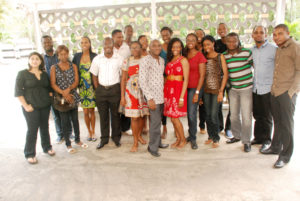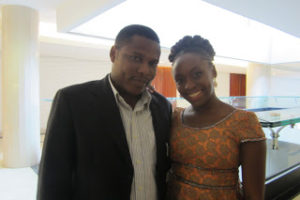If someone told me when I was five or fifteen that at thirty-two I would sit in an air-conditioned room in Lagos, on Victoria Island, with a woman named Chimamanda Ngozi Adichie and twenty other writers and I would sit for nine  days and we would all talk about writing, our own writing and the writing of others, that there would grow a soft place inside me for all the participants and organisers of this strange meeting, that the meeting would come to an end but actually that things like this never end. If someone had tried to convince me of this it would all have sounded rather unlikely. I guess when I was five Chimamanda wasn’t yet Chimamanda the acclaimed author and Farafina did not have a workshop in its name; there was no Farafina, not yet.
days and we would all talk about writing, our own writing and the writing of others, that there would grow a soft place inside me for all the participants and organisers of this strange meeting, that the meeting would come to an end but actually that things like this never end. If someone had tried to convince me of this it would all have sounded rather unlikely. I guess when I was five Chimamanda wasn’t yet Chimamanda the acclaimed author and Farafina did not have a workshop in its name; there was no Farafina, not yet.
Today I am grateful to have my own memories of what it was like to participate in the 2012 Farafina Creative Writer’s Workshop. And I struggle to write about it without using words like joy, profound, indelible. What struck me about the workshop and the manner in which Chimamanda led it was the intimacy she managed to create with us twenty-one strangers. The workshop days, eight-hour sessions, happened with plenty of humour, lengthy exchanges on the politics of writing, ethics, and what exactly is feminism. We were often asked to write true stories from our life experiences and then read them out to the class. In discussing our histories, our cultures, our prejudices and stereotypes there was sometimes offence taken. This brought with it many apologies, working through misunderstandings and always a burgeoning friendship.
There had been nine hundred applications to the workshop. Chimamanda took pains to explain how the selections were made, no one’s cousin made it through and there was no pandering to calls from big ogas who wanted their sons and daughters to be accepted.

